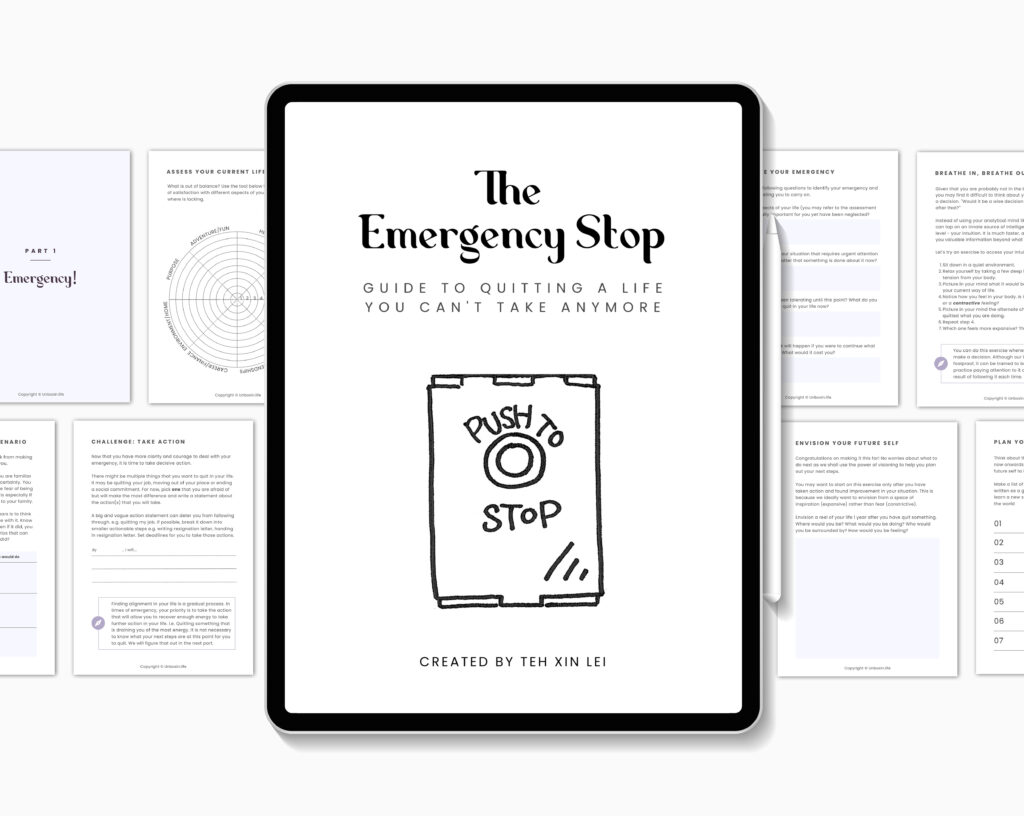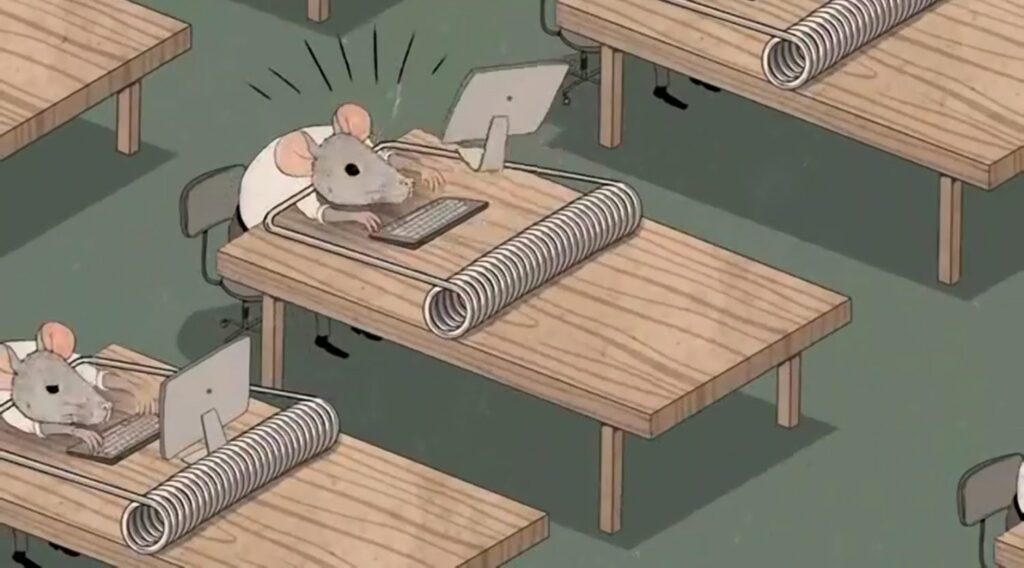What is the rat race? In short, it is a competitive struggle to get to a promised end which does not really exist. If you put a group of rats into a racing lane, they will see them scramble among each other without any idea about what is going on.
My Early Experience of the Rat Race
The rat race in Singapore starts young. I was already in a rat race without knowing that I was the moment I first entered school. You are constantly told to study hard without being given a good reason why. (I did try to ask my parents why and their response revealed that they did not know any better)
It does not help that the education system in Singapore is designed in a way to sort out kids according to their academic abilities. There are many suggestions that your performance is a reflection of your self-worth. I remember as a primary school student I frequently compared my test marks with my classmates to see where I stood. Classes were ranked in order of results since I entered Primary 3. There are several high-stake national examinations which start from as young as 12. It is deemed important to do well in order to move up to a “good” secondary school, junior college or university (usually as indicated by the cutoff points).
Among parents, subtle comparisons about their children are such as which school they go. If their child is falling behind in certain subjects, tuition would be suggested. This has led to a tuition industry valued at S$1.4 billion. Some parents go as far as to secure spots for their children in “good” primary schools due to their affiliation with “good” secondary schools.
I count myself lucky that my parents have never sent me for tuition, as school alone was tiring enough. I was constantly sleep-deprived and stressed out over homework, project work, tests and examinations. I also battled with chronic depression but was never given an option to pause my studies. The fact that there was no exit mechanism was senseless and traumatic for me. The negative effects that all these had on my health, well-being and development in my growing years were immeasurable.
Another thing that had always puzzled me was how students even knew what they wanted at that age. I remember that in junior college (my JC had a fairly elite student population), many students competed for government scholarships. Besides stellar academic results, one needed to prove him/herself an all-rounder by taking up co-curricular activities, leadership positions and volunteering etc. It was hard to tell whether students took up these activities out of passion or for resume purposes.
By the time I was about to enter university, the picture of the rat race became clearer to me. I was excited to choose my major because I could finally study something I liked. However, many people I knew around me made their choices based on the indicative grade profile and average graduate salaries. Obviously, the more prestigious courses of study were such as business, computer science, law and medicine. There was also a big deal placed on CAP (the equivalent of GPA) and securing internships. It felt as though everyone was guided by the same goal, their every decision geared towards the optimisation for success.
Of course, all these only expected to continue as the graduate steps into the working world. Choosing the top companies, vying for high salaries and positions, taking work performance as a reflection of one’s worth, etc…
After I graduated, I decided to quit the rat race. It did not mean much to me that I graduated from Asia’s top university. If everything that I had done since young was to get to this point, it is simply too high a price to pay.
Characteristics of the Rat Race
The rat race certainly exists in many urban societies, albeit to different extents. The one I described in my society is just one example.
Nonetheless, there are a few general characteristics of the rat race:
- Demands a high amount of your resources – time, energy and attention
- Never-ending (like running on a wheel)
- Competition with others
- Pervaded by a sense of fear and anxiety
Why the Rat Race is Senseless
Why did I quit the rat race? Because the rat race does not make sense to me. I will elaborate on a number of reasons below.
1) The Confusion between Wants and Needs
When we talk about the rat race, one common justification for it is about the high cost of living. The “cost of living” implies necessity. However, how much of it is actually a necessity? It seems to me that most are still confused between wants and needs.
Questioning Necessity
This brings me back to a memory a few years ago where I was seated in a MLM (multi-level marketing) company’s presentation, listening to the presenter’s pitch on why I need to have nearly a million dollars to live in my country.
Tuition and enrichment classes? Throwing a wedding banquet? Buying a car? Those were some of what were highlighted as “needs”. It honestly sounded convincing back then. More than a few young people there believed so.
What is a need really?
Let us recall our basic financial literacy class in primary school. A “need” is something that is essential for survival.
Just because more people can enjoy certain things now by virtue of improvements in standard of living, it does not mean that those things become necessities. Just because certain things are tradition, it does not mean that you need to follow it.
A case in point: Why are rich people also part of the rat race if the cost of living is probably not a matter of concern for them? These illustrate a phenomenon called “lifestyle creep” where one tends to spend more as they earn more. With more things to maintain, the cost of living is of course much higher. But those were never necessities to begin with! So, does earning more solve the problem? Not quite so.
Cutting Down on Needs
A suggestion I have is to cut down on needs.
Objectively, we are well off. The average (median) annual income of a Singaporean in 2022 is SGD60840 (USD45063) which places us as the top 1% earners in the world. To say that we are struggling would be quite an insult to the 99%, isn’t it?
Reflect on how often you say “I need…“. It is usually used so loosely that it becomes impressed upon our subconscious minds that we need those things even when we do not need them. Then, reevaluate what your wants and needs truly are.
I contend that this may not apply to all cases. For instance, there is indeed an alarming income inequality issue in the country and the lower-income may be struggling even with basic necessities. I am not quite qualified to comment on this situation for families as I am speaking from the perspective of a single. My opinion is that there are ways to get around this in today’s globalised world such as moving abroad.
Now you might be thinking that a life with minimal needs is not comfortable. Contrary to popular belief, your life can be more comfortable with less needs. Why so?
Wherever there is a need, there is also fear. The fear comes from an underlying belief that not attaining the need will bring about life-threatening outcomes. Therefore, a life with less needs will come with less fear, stress and anxiety.
2) Getting Caught Up in a Futile Chase
As it is called, a race is only a race if it is in relation to others. The goal of the rat race is to stay ahead of others, and that means that someone inevitably has to be behind you.
What drives people to work hard in the rat race other than reaching their material goals? In relation to their social environment, it is either the desire to get ahead of others or the fear of losing out to others. Regardless of which, both are very strong motivating drives.
Here is the problem: The harder everyone works, the higher the standards become. When many people are able to reach a high standard of work, it becomes the new expected standard. e.g. higher quality or efficiency. While it is good for the progress of society, it may not be so for the individual who has to work increasingly harder.
Another thing happens as well. When many people are able to attain their aspirations, new standards are needed for setting yourself apart from others. For example, let us consider the Singaporean dream of 5Cs – cash, credit card, car, condominium and country club membership. Over the years, the 5Cs have become less of a dream as it becomes easier for more people to attain these things. I wonder what the new dream will be.
Involution
The phenomenon I just described shows the problem of involution. The term “involution” originated from a social theory to describe a process where a growth in population did not lead to increased productivity in agricultural development. It became a trending word in China lately, translated to as 内卷 (Nèi juǎn), to describe the meaninglessness of the rat race.
Involution is basically a problem of unsustainability. As investment increases, the payoff in terms of gain in prestige or satisfaction from material does not increase correspondingly. In fact, it may actually reach a plateau. There is a sense of futility in this chase, much like Sisyphus who keeps rolling a boulder up only to have it roll down again.
Ending the Comparison
What can we do to end the comparison and not get caught up in this futile chase? My suggestion is to derive a very strong sense of self-worth from your internal being instead of external measures like what you have and what you do.
3) The Rat Race is a Mentality
Lastly, the rat race is a mentality. Although society has created the external conditions for the rat race, the rat race cannot exist if the participants do not subscribe to it.
There is much to be said about the mentality of the rat race. Generally, it supposes a world of scarcity and competition. The current narratives that dominate our world revolve around those themes. The evolution theory of “survival of the fittest”. The central assumption of economics about resource scarcity. It tells us that we live in a world where we have to compete for limited resources if we want to survive. It makes us fearful of getting the shorter end of the stick. Yet, we can question if that is really the case.
We can also look at the history of a nation to know how this mentality came about. For example, consider the fact that many of our forefathers were immigrants who came all the way here to get out of poverty in their homeland. They had to do whatever it took to survive. Although circumstances have vastly improved now, a fair bit of the survival-based mentality still remains. This is understandable as social evolution takes more time compared to an economic one but only 2-3 generations has passed since then.
When Never is Enough
One of the prevalent mentalities is a “Never is enough” mentality. Indeed, we find ourselves running a race that never ends when no amount of test score is high enough, no amount of preparation is good enough, no amount of income is high enough and so on…
No doubt this mentality is great for economic progress which aims for endless expansion. However, as a way of life it is self-defeating. What is the point if we cannot stop to acknowledge that our efforts are good enough? What is the point if we cannot stop to enjoy the fruits of our labour?
Cultivating Contentment
A suggestion I have for this is to cultivate the attitude of contentment. There is a Chinese idiom 知足常乐 (Zhī zú cháng lè) which means knowing when is enough and finding joy even in the ordinary. While we often preach this as a virtue, how much do we really practice this as a way of life? A man who knows how to be content with even the littlest things is the richest.
Besides contentment, trust is also key. There has to be some level of trust that one can be well-provided for even without being part of the rat race. Most of us would assume that to be true only with a wealthy background, good qualifications or connections. But no, I am talking about trust in a more spiritual way. Trust in life to provide. Trust in the existence of alternate models/pathways to abundance and prosperity, ones that do not demand senseless self-sacrifice.
I would say that this is the most tricky part about the rat race. It is difficult to change mentalities. That is why many remain trapped in the rat race even when they have seemingly achieved enough to get out of it. Nonetheless, it is not impossible if one radically has the desire to get out of the rat race.
Conclusion
Thus far, I have explained the reasons for why I think the rat race is senseless. I believe that life does not have to be lived in the rat race and that any individual who does not wish to be part of it should have a viable exit mechanism. I have provided a few clues for how that might look like but will continue finding out more as I go further in my journey outside of the rat race.

Quit the life that you can’t take anymore.
Are you tired, burnout and fed-up with your life? Something in you knows you need to press the emergency button to stop. But… something is holding you back somehow! THE EMERGENCY STOP is a guide created to help you take decisive action to quit something you dread in your life.


